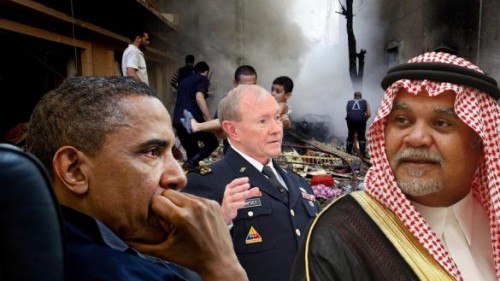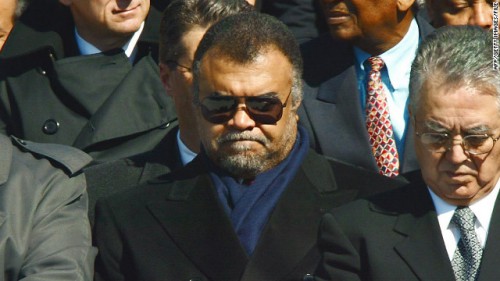The recent dismissal of Saudi intelligence chief Prince Bandar bin Sultan is a significant development in the region, but not one that signals a fundamental change. Although the sacking of the man long known as “Bandar Bush” represents the departure of an infamous regime figure with close ties to the US political elite, the House of Saud remains the unchallenged authority in one of Washington’s principal client states.
That being said, Bandar’s unceremonious exit could be a sign that certain policies of the Saudi monarchy, primarily the use of Wahhabi extremist networks to achieve political goals in Syria and beyond, could undergo a strategic shift. Additionally, this development might also be an indication that the nature of Riyadh’s relations with Washington could be changing, if only at least superficially and gradually.
Bandar, Syria, and the Geopolitical Chessboard
It is an open secret that Prince Bandar bin Sultan is the architect and principal manager of Saudi Arabia’s strategy in Syria, and to varying extents depending on who one asks, the central figure in Saudi Arabia’s geopolitical strategy in the Middle East more broadly. With his illustrious (infamous) resumé as Saudi Arabia’s top negotiator when it comes to the West and Saudi geopolitical strategy, it came as little surprise to many observers when in 2012 Bandar was appointed intelligence chief by the Saudi king, with the specific task of handling Riyadh’s destabilization and subversion of Syria.
Jamal Khashoggi, a prominent Saudi commentator with ties to the royal family noted at the time that, “There was a feeling that we needed stronger intelligence and Bandar has a history of this sort…We are witnessing the start of a new Middle East with the collapse of the Syrian President (Bashar al-Assad’s) regime. We are worried about Jordan and Lebanon.” Statements such as these merely confirm the widespread understanding that Bandar’s appointment signaled more than just a change of leadership, rather it was part of a broad initiative by the Saudis to use their intelligence apparatus as a means of influencing the development of the region and, in so doing, maintaining and strengthening Saudi dominance in the greater Middle East. Seen in this way, Bandar, and indeed the entire Saudi policy vis-à-vis Syria, can be understood as a move to consolidate Saudi power through destabilization.
In fact, for a time at least, it seemed that Bandar would be successful in the goal of toppling Assad and buttressing Saudi influence. The Israeli publication Haaretz published an article in July 2012, just a few weeks after Bandar’s appointment, in which the author explained that:
The main reason for his [Bandar’s] appointment now is that Saudi Arabia is preparing for the next stage in Syria, after President Bashar Assad leaves the political stage one way or another and Syria becomes a battleground for influence…Bandar is considered the CIA’s man in Riyadh…he’s known as a can-do person who makes quick decisions and doesn’t spare resources to achieve his objectives…Saudi commentators say Bandar was the one behind the decision to give money to the Syrian rebels, and even to buy weapons for them. They say the Saudi demand that Assad step down is part of Bandar’s strategy…The Saudi policy on Syria is being closely coordinated with the United States.
Essentially then, Bandar should be understood as the critical linchpin in Riyadh’s geopolitical and strategic posture throughout the region; at once the bridge between Riyadh and Washington, and the manager who “gets his hands dirty” with the hard work of organizing the arming and financing of the jihadis in Syria, many of whom were funneled into the country through the kingdom’s own Wahhabi networks. However, it is his coziness with US intelligence that makes his influence particularly significant considering the political distance the Obama administration has attempted to maintain from the destabilization campaign in Syria.
In this way, Bandar acted as a surrogate for Washington, dutifully carrying out policy in line with US interests while providing “plausible deniability” for the administration with regard to the subversion of Syria. As the Wall Street Journal reported, “They [Saudi officials] believed that Prince Bandar, a veteran of the diplomatic intrigues of Washington and the Arab world, could deliver what the CIA couldn’t: planeloads of money and arms, and, as one U.S. diplomat put it, wasta, Arabic for under-the-table clout.”
Bandar’s influence on the Syria issue did not stop with his management of the crisis and relations with the US. In fact, Bandar became the principal emissary for the House of Saud, the de facto voice of the king, attempting to influence all sides in the crisis and affect an outcome desirable to Riyadh. It is to this end that Bandar visited with Russian President Putin in summer of 2013, at the height of the US drumbeat for war on Syria, looking to coax Moscow into making a deal and abandoning its support for Syrian President Assad.
According to leaked documents from the meeting, Bandar reportedly offered cooperation with Russia on a number of critical issues, including the prevention of terrorism at the 2014 Winter Olympics in Sochi, in exchange for Russia’s acquiescence on the issue of Syria. The leaked report described the meeting as stormy, with Russian President Putin deeply outraged at the brazenness of Bandar’s threats, which he undoubtedly framed as “assurances.” Though the actual tenor and specifics of the meeting might be up for interpretation, what is clear is that Bandar failed to secure any significant change from Moscow regarding Syria. In fact, it could be argued that his bombastic style of realpolitik backfired, hardening Russia’s resolve and commitment to Assad.
Additionally, there was much speculation in the international press that Bandar was directly involved in funneling chemical weapons into the hands of jihadi fighters inside Syria, specifically that Bandar facilitated the exchange of sarin gas used in the chemical attack on Ghouta, a suburb of the Syrian capital of Damascus. The accounts of Bandar’s involvement, which came both from intelligence experts and Syrian rebels on the ground, coincide with the fact that it was the Saudis themselves, undoubtedly organized by Bandar, who initially brought the allegations of the use of sarin by Assad’s government. So, it would seem that, from the very beginning, Bandar’s strategy to topple the Assad regime involved the funneling of weapons, including chemical weapons, into the hands of Saudi-sponsored jihadis, and then using the attacks they themselves perpetrated to blame the government in Damascus. Bandar’s patrons and poker buddies in Langley were undoubtedly proud.
Today, nearly two years after Bandar was appointed intelligence chief and “Master of Ceremonies” for the assault on Syria, the Assad government is still in place, significantly more entrenched and stable than it was in 2012, and it is instead Bandar who has been removed. Despite his well laid plans and deep connections throughout the region, Bandar failed in his quest to overthrow Assad and destabilize Syria to the point of its conflagration. Perhaps more than anything else, it was this failure that lead to his ouster.
Riyadh’s Man in Washington, Washington’s Man in Riyadh

The above excerpt illustrates quite clearly the fact that Bandar was far more than a Saudi diplomat in the US. Rather, that he was a representative of the US-NATO-GCC imperial system, one who could maneuver seamlessly between the circles of power in Washington and in the Middle East, a man who represented more than simply his country, a man who spoke for, and dealt with, the political establishment in both countries. Bandar’s list of accomplishments alone demonstrates this quite clearly.
Bandar boasted an extensive resumé including the securing of AWACS aircraft for Riyadh over objections from Tel Aviv in the 1980s, the funneling of money and weapons, as well as the recruitment of fighters, to the mujahideen fighting the Soviets in Afghanistan, funding the contras of Nicaragua, and financing to the tune of $10 million anti-communist politicians in Italy. Bandar is also credited with brokering the all-important deal regarding US basing rights in Saudi Arabia for the first Gulf War. His close relationship with George H.W. Bush, including the vast CIA network that Bush headed, was infamous. In fact, Bandar and George Bush (both elder and younger) were so close that the Prince earned himself the nickname “Bandar Bush”, a moniker he still holds today.
The fact that Bandar moved mostly seamlessly between administrations, always maintaining the all-important close ties necessary for a man in his position, shows him to be far more than a deft politician and diplomat. Rather, Bandar was a true representative of the military-industrial-imperial system of which the US is the dominant player and within which Saudi Arabia is comfortably situated. Bandar represented a bridge between different cogs within that system. It is for this reason that his dismissal is so significant. Not only does Bandar’s exit signal a change in Saudi policy in Syria, it is an indication that the one-dimensional relationship between Washington and Riyadh may be undergoing a critical shift.
One should be cautious however not to conflate Bandar’s departure with a departure from the alliance that has held for decades. Instead, one should see this as merely a geopolitical and strategic evolution with regard to Syria and, indeed, the whole region. As Saudi Arabia comes to terms with a failure of its policy in Syria, and it recognizes the changing nature of the region with a new, friendly government in Egypt, Riyadh is revamping its policy. In so doing, Bandar, a symbol of Saudi power for decades, became the sacrificial lamb.
Unfortunately, the power and money that Bandar faithfully represented for all these years remain. So too do the Wahhabi fighters and the ideology of extremism that Saudi Arabia exports as a means to further its political agenda. Until such time as these are delegitimized and dismantled, no individual’s exit from the stage, not even one as “larger than life” as Prince Bandar, will fundamentally change Saudi policy or the region.
Eric Draitser is an independent geopolitical analyst based in New York City, he is the founder of StopImperialism.org and OP-ed columnist for RT, exclusively for the online magazine “New Eastern Outlook”





 del.icio.us
del.icio.us
 Digg
Digg